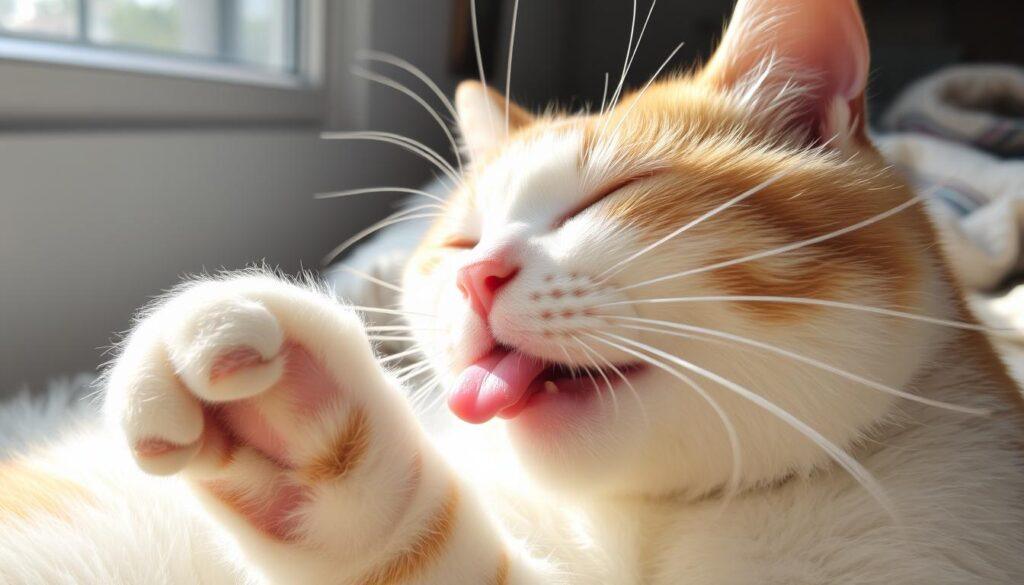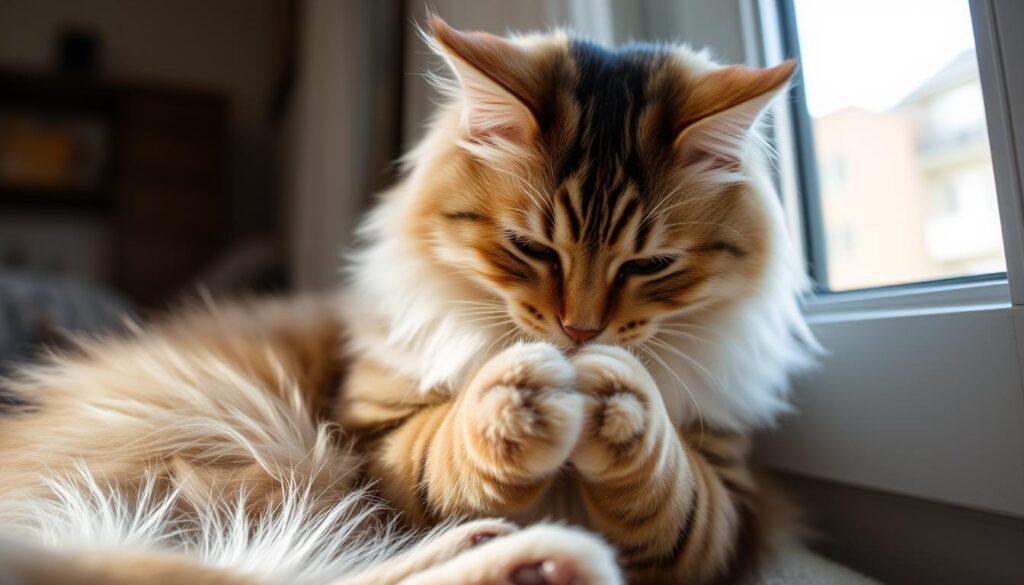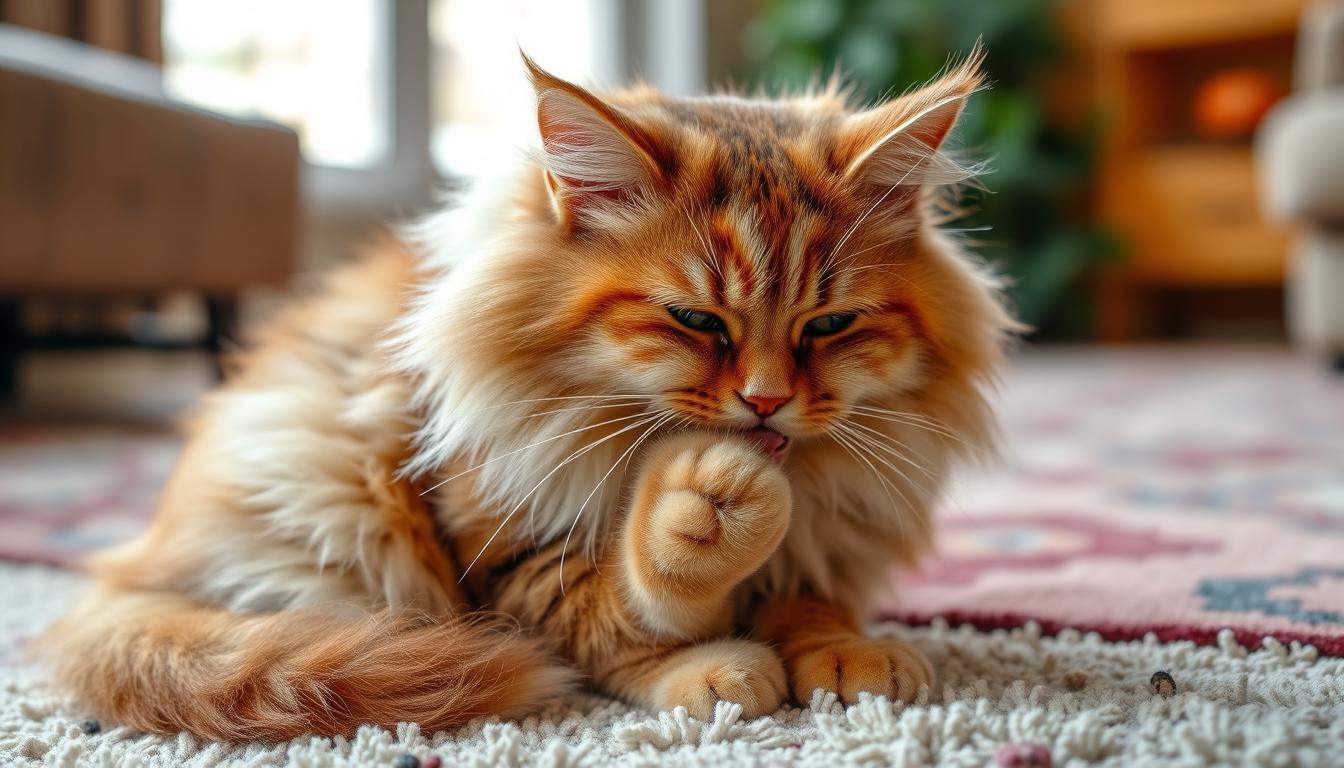Did you know that 60% of cats groom too much, including cat biting paws when cleaning? This shows how common it is for cats to groom, often leaving owners confused. Cats spend up to 50% of their time cleaning themselves, but when they bite their paws, it can cause concern.
Cats use their tongues to clean their fur, with licking making up 60-80% of their grooming2. They also bite and chew to untangle fur, especially in long-haired cats2. But, if a cat bites its paws too much, it might be sick or stressed.
Nail biting is very common in cats, starting early in kittens3. While some paw biting is normal, too much can mean an infection3. Cats might also bite their nails due to anxiety, needing medication to calm down3.
It’s important to know why your cat grooms itself. In this article, we’ll explore the reasons behind cat excessive licking and biting of paws. We’ll help you tell normal from abnormal behaviors.
Key Takeaways
- Excessive grooming and paw biting can be a sign of underlying health issues or psychological distress in cats.
- Licking accounts for the majority of a cat’s grooming process, while biting and chewing help detangle fur and remove debris.
- Nail biting is common in cats, but frequent and excessive biting may indicate an infection or anxiety.
- Biological reasons for paw biting include removing parasites, cleaning wounds, and detangling fur.
- Stress, anxiety, and compulsive behaviors can also lead to excessive grooming and paw biting in cats.
The Grooming Process in Cats
Cats are meticulous about their grooming, which is key to their health. They use licking and biting to keep themselves clean. Licking helps remove dirt and spreads oils in their fur4.

Licking
Cats groom mainly by licking. Their tongues have special barbs that act like a comb. These barbs clean their fur and spread oils, keeping it healthy and clean.
Licking also helps cats regulate their body temperature and relaxes them.
Biting and Chewing
Cats also bite and chew as part of grooming. This helps remove tough dirt or clean hard-to-reach spots. Biting cleans irritated areas and gets rid of parasites4.
Nearly all cats chew their nails during grooming5. They do this to clean their paws or manage broken nails5.
But, too much biting or chewing can mean there’s a problem. It could be an injury, infection, or stress5. Owners should watch for changes in their cat’s grooming habits. If it’s too much, they should talk to a vet5.
| Grooming Method | Purpose |
|---|---|
| Licking | Remove dirt, distribute natural oils, regulate body temperature, provide calming effect |
| Biting and Chewing | Remove stubborn debris, address hard-to-reach areas, remove parasites, detangle fur, maintain nail health |
Biological Reasons for Biting While Grooming
Cats spend a lot of time grooming themselves, up to half of their waking hours6. This grooming is crucial but can sometimes lead to issues like biting their paws. Knowing why this happens can help owners spot health problems early.

Removing Parasites
Cats might bite their paws due to parasites like fleas or mites. These pests make cats itch and irritate their skin. Cats can easily reach all parts of their body to groom, making it easier to target these spots6. If not treated, these parasites can cause more skin problems and lead to cat overgrooming.
Cleaning Wounds and Irritations
Cats also bite their paws to clean wounds or irritations. This behavior helps remove dirt and bacteria, aiding in healing. But, if a cat keeps focusing on one spot, it might have a serious issue that needs a vet’s help.
Detangling Fur
Cats bite their paws to untangle their fur. Shedding hair can get trapped, causing knots. By biting, cats can detangle their fur and keep it healthy. Kittens start grooming themselves at four weeks old, learning this skill early6.
| Biological Reason | Key Points |
|---|---|
| Removing Parasites | Fleas and mites cause itching and irritation, leading to excessive biting and chewing of paws. |
| Cleaning Wounds and Irritations | Cats lick and bite their paws to clean injuries and promote healing, but persistent focus may indicate a more serious issue. |
| Detangling Fur | Biting and chewing helps remove tangles and mats from the coat, maintaining its health and appearance. |
While some paw biting is normal, too much can be a sign of health issues. If a cat shows cat paw chewing obsession or cat paw sucking, see a vet. Understanding these behaviors and watching for signs of distress can help keep cats healthy and happy.
Psychological Factors
Cats spend a lot of time grooming, up to 50 percent of their day7. But, too much paw licking and biting can mean they’re stressed or anxious. This can lead to behaviors like cat stress licking, cat anxiety paw licking, and even self-mutilation.
Stress and Anxiety
Cats like routine and can get stressed by changes. New pets, moving, or small changes in routine can upset them. They might start grooming too much as a way to cope, leading to behaviors like nail and foot biting7.
Studies show over 50% of paw licking in cats is due to stress or boredom8. It’s important to find out what’s causing a cat’s anxiety. A stable, fun environment with lots of play and mental challenges can help reduce stress and stop excessive grooming.
Compulsive Behavior
Excessive paw licking and biting can turn into a compulsive disorder. Cats might keep doing it even when they’re not stressed or need to groom. This can cause hair loss, skin problems, and open wounds.
Compulsive grooming can also be a sign of an underlying medical condition, such as allergies or pain, so it’s essential to consult with a veterinarian to rule out any physical causes.
A vet can do a full check-up to find out why a cat is obsessed with licking its paws8. They might suggest changes in the cat’s life, like more toys and playtime, to help8. In serious cases, the vet might need to prescribe medication or do tests to find the cause8.
| Psychological Factor | Potential Causes | Possible Solutions |
|---|---|---|
| Stress and Anxiety | Changes in environment or routine, new pets or family members, moving to a new home | Providing a stable, enriching environment, ample opportunities for play and mental stimulation |
| Compulsive Behavior | Underlying medical conditions (allergies, pain), prolonged stress | Veterinary intervention (medications, allergy testing), lifestyle changes (toys, affection, interactive challenges) |
Environmental Influences
Environmental factors can greatly affect a cat’s grooming habits. Things like pollen, dust, and cleaning products can make them itch and feel uncomfortable. This leads to more grooming and paw biting9.
Parasites like fleas and ticks also play a role. They make cats’ skin itch, causing them to bite and chew at their paws910.
Indoor cats might groom too much due to boredom or lack of stimulation9. Giving them lots of toys, scratching posts, and playtime can help. Also, making sure they have a safe, comfy place with food, water, and litter boxes can reduce stress.
Cats can also get allergies from food, the environment, or flea bites. This makes them itch and lick and bite their feet too much10. Regular checks for parasites and using vet-approved preventatives can help keep fleas and ticks away. This reduces cat anxiety grooming and excessive biting10.
Stress and anxiety can make cats groom too much, leading to foot-biting. Finding and fixing the stress source is key to stopping this behavior10.
Other things that can cause cat boredom licking and too much grooming include:
- Changes in routine or living situation
- Lack of mental stimulation and physical activity
- Overcrowding or conflicts with other pets in the household
- Exposure to loud noises or unfamiliar scents
By tackling these environmental factors, cat owners can lessen their pets’ stress and anxiety. This helps reduce excessive grooming and paw biting behaviors.
Cat Biting Paws When Cleaning: Understanding the Behavior
Cats are meticulous about their grooming. Sometimes, they bite their paws as part of this. While occasional paw biting is normal, too much can be a sign of health or behavior problems. It’s important to know when grooming is normal and when it’s not.
Normal vs. Excessive Grooming
Normal grooming in cats is short and occasional. It helps remove dirt and loose fur. But, if a cat’s grooming becomes too much, it can show signs of cat overgrooming symptoms. These include bald patches, skin irritation, and sores.
- Bald patches or thinning fur
- Skin irritation or redness
- Open sores or wounds
- Excessive time spent grooming
Allergies often cause cats to lick their paws too much, affecting many cats11. Parasites like fleas or mites can also make cats lick their paws a lot11. Stress or anxiety can also lead to this behavior, especially with changes in the environment11.
When to Seek Veterinary Advice
If your cat is biting its paws too much, you should see a vet. A vet can help find out why and fix the problem11.
Your vet will check for health issues like allergies or parasites. They’ll also look for skin problems or pain11.
After finding the cause, your vet will suggest treatments. This could include medicines, flea control, or changes in diet11.
- Medications to manage allergies or skin conditions
- Flea and parasite control measures
- Dietary changes to address food sensitivities
- Behavioral modification techniques to reduce stress and anxiety
Playing with toys and giving your cat activities can help with stress-related paw licking11.
It’s also important to make your cat’s environment stress-free. Give them toys, activities, a balanced diet, and a clean, comfy home. Understanding and addressing your cat’s grooming habits can keep them healthy and happy.
Conclusion
It’s key to understand cat grooming habits to keep our pets healthy and happy. While cats naturally groom themselves, too much can mean they’re stressed or have skin issues12. Cats also groom as a way to show love and remember their kitten days13.
Knowing why cats bite their paws too much helps us help them. This could be due to stress, environment, or even health problems14. We can reduce stress by making their space calm and giving them fun activities12.
If your cat’s paw biting doesn’t stop and hurts them, see a vet12. With the right care, most cats can stop excessive grooming. This lets them groom normally and strengthens their bond with us.
FAQ
Is it normal for cats to bite their paws while grooming?
What are some biological reasons why cats might excessively bite their paws?
Can stress and anxiety cause cats to overgrooming and bite their paws?
How can environmental factors influence a cat’s grooming behavior?
How can I tell if my cat’s paw biting and licking is excessive?
What should I do if my cat is excessively biting and licking their paws?
Source Links
- My cat keeps biting at her paw. Why? – https://forums.digitalspy.com/discussion/952948/my-cat-keeps-biting-at-her-paw-why
- Why do cats bite themselves while grooming? – https://vanpaws.com/blogs/cat-blogs/why-do-cats-bite-themselves-while-grooming?srsltid=AfmBOopFw0ZMhxIjnFqONLtsBlU8X7jS2YSs5G4vm5vpZyjtrO-sxmR3
- Is Cat Nail Biting a Common Behavior? | The Village Vets – https://thevillagevets.com/blog/cat-nail-biting/
- Why do cats bite themselves while grooming? – https://vanpaws.com/blogs/cat-blogs/why-do-cats-bite-themselves-while-grooming?srsltid=AfmBOorznaFCROwK_xfz88YUfnxf2dmWh-b4a8LsQODaFklHRGbsf0q_
- Nail Biting in Cats – https://www.petmd.com/cat/behavior/nail-biting-cats
- Why does my cat bite his nails? – https://thecatisinthebox.com/blogs/kitty-contemplations/why-does-my-cat-bite-his-nails?srsltid=AfmBOoqxtR1PeLTBABUNpPrTjDr0TlmNqf8sfridLuiG-_4zgS-8UIQZ
- Why Does My Cat Bite Their Feet? 7 Vet Reviewed Reasons – Catster – https://www.catster.com/cat-behavior/why-does-my-cat-bite-their-feet/
- Excessive Paw Licking in Cats Explained – https://www.petassure.com/maxscorner/excessive-paw-licking-in-cats-explained/
- Why do cats bite themselves while grooming? – https://vanpaws.com/blogs/cat-blogs/why-do-cats-bite-themselves-while-grooming?srsltid=AfmBOooKyu7XD7zNedWlUXO2Uewd1No1HMnJc5VEQ35zKim-ik5KaTd0
- Why Is My Cat Biting Their Feet? Vet-Approved Causes, Solutions & FAQ | PangoVet – https://pangovet.com/pet-behavior/cats/why-is-my-cat-biting-their-feet/
- Why Is My Cat Licking Its Paws? Understanding Causes and Solutions | Brown Veterinary Hospital – https://brownvethospital.com/blog/cat-licking-paws/
- Cat Chewing Her Fur Off? Vet-Reviewed Reasons & Solutions – Catster – https://www.catster.com/lifestyle/cat-biting-fur-off/
- Why Do Cats Knead and Bite Blankets? – Cats.com – https://cats.com/why-do-cats-knead-and-bite-blankets
- Why Does My Cat Lick And Then Bite Me? – https://cardboardcathomes.com/blogs/info/why-does-my-cat-lick-and-then-bite-me?srsltid=AfmBOoqxzCLfaCvZBFRCj003WOw31EVU7wC2JD6B2NEyXl187uZFeJJb

